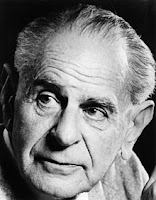 |
| Antony Flew |
These are my last comments on Man Ho
Chan’s article, which reviews and refutes recent attempts to make multiverse theories
scientific. Here I’ll deal with those attempts that propose renouncing the
scientific method to make the theories of the multiverse scientific. This group
of proposals, the most radical, can be summarized as follows:
- Epistemological anarchy: Proposed by Feyerabend in 1988, it argues that science is an essentially anarchic enterprise: theoretical anarchism is more humanitarian and more likely to foster progress than its law-and-order alternatives. In other words: We had better give up applying the scientific method, lest we miss some pseudoscientific theory that could have been useful.
Man Ho Chan comments this: It is doubtful that multiverse theories can make any real scientific advancement. In some versions of multiverse theories, they suggest that all that can happen happens. In other words, these versions can explain everything. If a theory can explain everything, it does not lead to any scientific advancement… Therefore, it seems that multiverse theories are passively driven by empirical findings or theoretical constructions rather than actively leading to any new scientific advancement.





